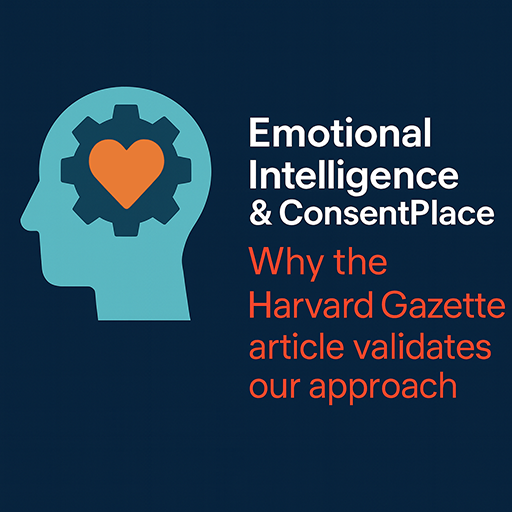The Harvard Gazette article makes a compelling case: The age of purely technical or analytical skills is past. Today, organizations succeed not just by what people know, but how they relate, perceive, and respond. It states:
There are people who are highly competent in technical and analytical skills, but when they interact with others, projects stall. … So many resources are wasted in emotional misunderstandings or in people’s difficulty with emotional regulation.” The Harvard Gazette
That insight maps seamlessly to what we do at ConsentPlace.
Here’s how:
1. Self-awareness & regulation → digital trust
The article identifies self-awareness (“being conscious of our own thoughts, feelings”) and self-regulation (“manage our emotions in a healthy way”) as foundational to EQ (Emotional Intelligence). The Harvard Gazette
At ConsentPlace we embed these concepts into the platform: by capturing signals about user sentiment, adjusting flows dynamically, and ensuring that interactions don’t feel robotic or tone-deaf. In other words: the system is aware of its own “emotional state” (via cues) and can regulate responses accordingly.
2. Social awareness & skills → user-centric consent flows
The article further emphasizes empathy (“noticing what’s going on in others”) and social skills (“ability to work well in teams, to be able to solve conflicts”) as core components of EQ. The Harvard Gazette
For ConsentPlace, that means designing consent experiences not as one-sided check-boxes, but as relational conversations. We recognise the user’s context, reflect on their needs/fears, and engage in a way that builds trust and transparency. That aligns exactly with the article’s message that relational intelligence matters.
3. Tech + human interplay → the future of interaction
In the article, it’s noted that as AI and automated interactions increase, authentic human connection becomes more important:
As people increasingly are interacting with chatbots … I suspect that authentic, connected human interactions are going to become more important.” The Harvard Gazette
ConsentPlace takes this forward by bridging human-centered emotional intelligence with technological interaction — ensuring that even digital consent becomes emotionally intelligent, effectively human-aware.
🎯 In short: The Harvard article underscores that relational, emotional, and regulatory skills are now core competencies.
ConsentPlace embodies this by making Emotional Intelligence (EQ) not just a concept, but the structural foundation of how consent environments should be built: self-aware, socially conscious, emotionally connected.
Question? Let us know:


This really resonates; technical know-how is important, but how we relate and respond shapes outcomes. It’s heartwarming to see emotional intelligence highlighted as a key part of success.